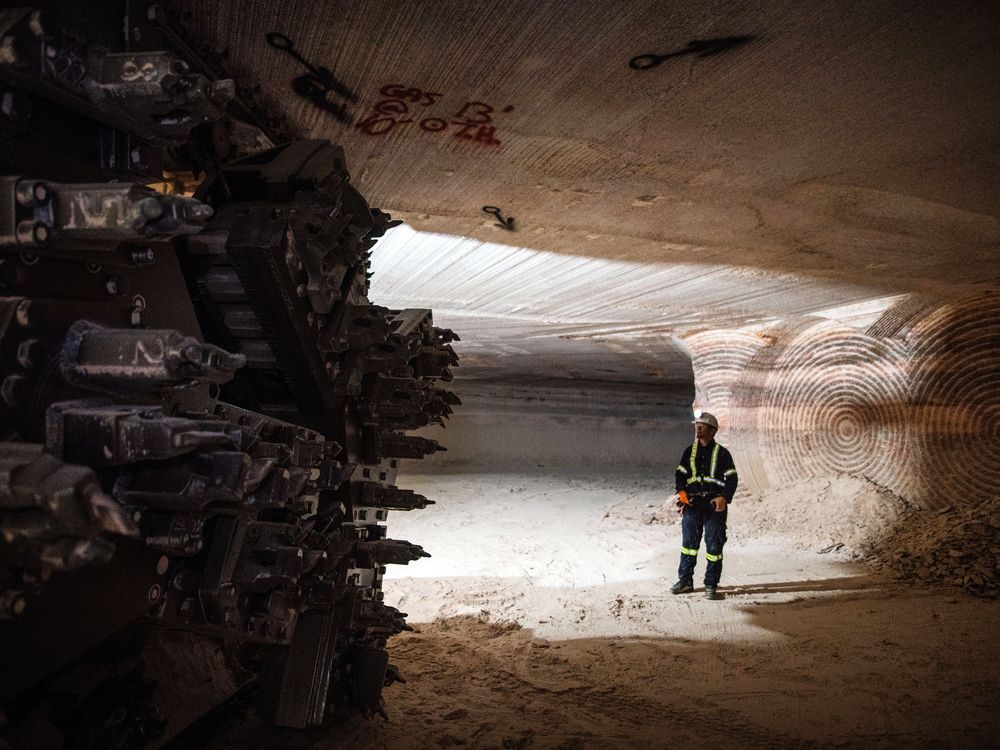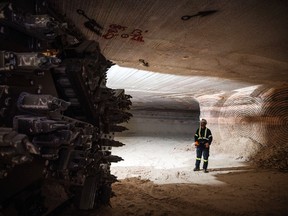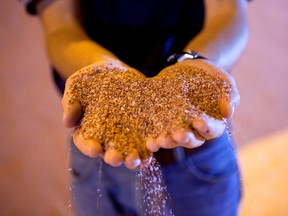Nutrien sees disruption to global food supply chain extending ‘well beyond this year’

Posts record net earnings, will accelerate plans to increase fertilizer production

Article content
Saskatoon-based Nutrien Ltd. on Tuesday posted record net earnings and said it would accelerate plans to increase fertilizer production, signalling it sees continued disruption in the global food supply chain for years to come amid sanctions on Russia and Belarus.
Advertisement 2
Story continues below
Article content
The company reported a record $1.4 billion in net earnings in the first three months of 2022, up from $1.2 billion in the fourth quarter of 2021, which it attributed to higher commodity prices.
Nutrien also increased its full year guidance for adjusted EBITDA to $14.5-$16.5 billion — a 45 per cent increase at the low-end from February when it expected $10-$11.2 billion — and announced it would increase its annual potash production in 2022 to 15 million tonnes, up 10 per cent from 2021.
In an interview with the Financial Post, interim chief executive Ken Seitz noted that Belarus and Russia together account for 40 per cent of global potash production. For months, he said Nutrien executives have studied how the Ukraine conflict is stifling the export of agricultural and fertilizer products from the region and tried to consider how the situation may play out — whether it would end swiftly in occupation or a diplomatic resolution, or whether it may drag on for an extended period of time.
Advertisement 3
Story continues below
Article content
“As this has played out over the last month, I think the world is concluding the most likely scenario is a drawn-out conflict,” Seitz told the Financial Post.
On Tuesday morning, he told analysts on a conference all that his company would increase both potash and nitrogen production significantly this year and likely into the future.
“We are discussing the supply challenges in the context of 2022,” Seitz said on an earnings call. “However, we believe these issues could extend well beyond this year. Sanctions on Russia and Belarus have the potential to create more lasting changes to global trade patterns as customers prioritize reliability of supply.”

Canada, the U.S. and various other countries imposed sanctions on Russian exports earlier this year after it invaded Ukraine. Belarus has been under sanctions since 2020 amid election irregularities and human rights abuses.
Advertisement 4
Story continues below
Article content
Seitz said his company also lowered its estimate for global potash production this year to between 60 to 65 million tonnes — down from an earlier estimate of as much as 71 million tonnes.
Nutrien, the largest potash producer in the world, operates six mines in Saskatchewan, and Seitz said the company could ramp up to 18 million tonnes of annual potash production with minor capital costs.
But it would take years, and the company would want to make sure it could sell the additional volumes to cover higher operating expenses from such an expansion, he said.
“These are decisions that require careful planning as they have long term impacts on our operations,” he said, promising more details at the company’s virtual investor update on June 9.
Advertisement 5
Story continues below
Article content
For some companies such as BP Ltd., which had operations in Russia, recent sanctions against the country led to billions of dollars in losses. But Nutrien’s outlook, and recent results, suggest trade disruptions caused by sanctions are also creating economic opportunities for some companies.
Seitz started the call by expressing sympathy for people affected by the conflict. But he noted that Ukraine and Russia account for a significant portion of the world’s supply of fertilizer and other agricultural products.

The global food chain is connected, Seitz explained. As global grain and oilseed inventories decline, and the price of corn, soybeans, wheat and other key commodities move higher, farmers’ prospective margins on crops also move higher. That leads many farmers to plant more acreage and apply more fertilizer to capitalize on favourable market conditions.
Advertisement 6
Story continues below
Article content
While potash itself is not sanctioned, the cumulative effects of sanctions on banking, shipping, insurance and other parts of the economy are expected to trickle down and affect production.
Jason Newton, Nutrien’s chief economist, said he expects potash production in Belarus in 2022 to decline by six to eight million tonnes, while Russia could face a two to six million tonne decline.
“It will take some time to rebuild those export capabilities,” said Newton, who added the two countries had been expected to add 60 to 70 per cent of the new potash supply projected to hit the market in the next five years.
-

BHP CEO eyes pivot to potash, but Nutrien chief warns new mines make ‘no sense’
-

The smart move is to buy it and break it up’: Speculation mounts as BHP examines Nutrien
-

‘Unexpected twist’ at high-flying Nutrien as second CEO resigns in less than a year
-

Nutrien to boost potash production by 1 million tonnes amid worries about food security
Advertisement 7
Story continues below
Article content
Overall, Nutrien said the cumulative effect of the supply challenges and resulting higher commodity prices more than offset other headwinds such as a delayed start to the U.S. growing season, caused by rain, that brought in lower overall fertilizer sales volumes.
Seitz said many growers are looking for alternative sources of fertilizer, creating opportunities for companies such as Nutrien.
He added that the “phones are ringing” at Canpotex, the Canadian firm responsible for selling potash production out of Saskatchewan, and where he previously served as chief executive.
“Suffice it to say that certainly from a global demand perspective, Canpotex has homes for potash and for increased levels of potash, and that’s what’s driving us, as we said in our opening comments, on looking at the potential to accelerate our ramp up of potash production,” he said.
• Email: gfriedman@postmedia.com | Twitter: GabeFriedz
Advertisement
Story continues below









